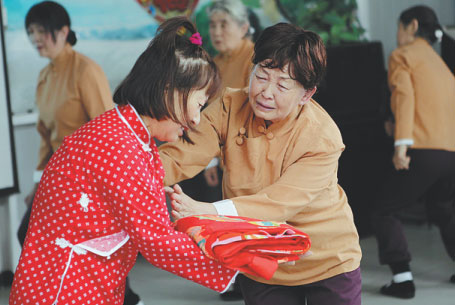Finding a family in the fog of war
By Cai Hong and Shan Yi (China Daily) Updated: 2015-08-24 07:48High hopes
|
More than 50 Japanese citizens left in China by their parents after Japan's surrender in 1945 stage a self-penned play, Chinese Mother, at a nursing home in Beijing in July. Zou Hong / China Daily |
Once again, she tried to trace her biological parents. One day she received a letter from a veteran in Hokkaido, Japan, who was trying to find a daughter he'd left in China. Facially, Ikeda bore a striking resemblance to the girl, and her date of birth and blood group were the same. Eventually, the veteran invited Ikeda and her children to visit him.
In July 1981, Ikeda, then 37, made an emotionally charged journey to Hokkaido, where she applied for Japanese citizenship and underwent DNA tests. She also took the veteran's family name as her own, but the situation deteriorated when the results of the test showed that she wasn't his daughter. The old man was so angry he threw Ikeda and her children out of his house, but his wife provided a lifeline by secretly giving the young mother 100,000 yen ($820 today).
Ikeda went to a local ward office to apply for Japanese citizenship before her Chinese passport expired. However, the authorities refused to accept a certificate issued by the Chinese government that confirmed Ikeda was a war orphan, and demanded proof that she had Japanese family members. Unable to provide the required evidence, Ikeda was told that the family would be forcibly repatriated.
"Under the circumstances, I would have be seen as a fake Japanese if I'd returned to China," she said.
Ashamed and desperate, she decided to take an overdose of sleeping pills, but had a change of heart when she went to take a last look at her sleeping children. She knew she had to stay alive to care for them. "It was the small hours of the morning, and reminiscent of the scene when my Chinese mother wanted to die," she said.
In December 1981, Ikeda, now penniless, took her children to live in Tokyo, and caused a sensatin when the Asahi Shimbun ran a story about her plight.
A law firm volunteered to help Ikeda obtain Japanese citizenship. To do so, she would need a Japanese name, so she chose Akiko Imamura, which she used for 13 years. Akiko was the equivalent of her Chinese name, Ming, and Imamura was the surname of the lawyer who helped her and gave her a job as a clerk. The family was reunited when her husband moved to Japan to join Ikeda and the children.





